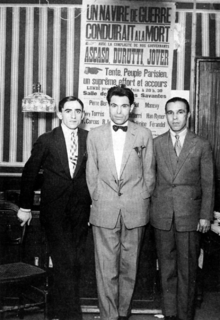Los Solidarios

Los Solidarios
Los Solidarios was created as a successor of a previous group called Los Justicieros (“The Avengers”), created in San Sebastian by Durruti and local anarchists such as Ruiz, Aldabatrecu, Marcelino del Campo or Suberviola.[1] The group was integrated by anarcho syndicalists, and it set up a network in order to buy and store guns, with which to attempt on members of the Sindicato Libre, (“Free Trade Union”), an employer-obeying organization. Los Solidarios are considered responsible for bank robberies, such as the Bank of Spain Robbery (September 1923), and for the murder of the Zaragoza cardinal Juan Soldevilla y Romero (1923). After that, and pressured by the Primo de Rivera dictatorship, Durruti, Francisco Ascaso and other members fled to France, and then to Latin America, where they were charged with more robberies. They returned to Europe, settled down in France, and were charged with attempting on Alfonso XIII on a visit to Paris, so they had to live clandestinely. They were expelled from France and settled down in Belgium, where they were allowed to stay. With the advent of the Spanish Second Republic (1931), some of the members that had been able to return to Catalonia decided to enter the Federación Anarquista Ibérica (“Iberian Anarchist Federation”), as a group called Nosotros (“Us”), holding more radical points of view than those of the FAI itself. When the Spanish Civil War broke out, the group dissolved as such, but they kept working inside the FAI.
Juan García Oliver, member of Los Solidarios, stated in a speech, whose recording has survived,[2] that the members of the group, were the best working-class terrorists and "the kings of Barcelona's workers pistol", the ones with the best chance to strike back against the “white terrorism” directed towards workers by the employers, such as the murders of Salvador Seguí and Francesc Layret .[3]
Members
Some of the members of “Los Solidarios” were
- Juan García Oliver
- Buenaventura Durruti
- Francisco Ascaso
- Antonio Ortiz Ramírez
- Ramona Berri
- Gregorio Jover
- Antonio Martín Escudero
- Miguel García Vivancos
- Pepita Not
- Rafael Torres Escartín
- Ricardo Sanz
Legacy
Singer-songwriter Chicho Sánchez Ferlosio wrote a song called “Homenaje a Los Solidarios” (“Homage to Los Solidarios”), about the group.[4]
Notes
References
- Sanz, R. (1966), El sindicalismo y la política: Los "solidarios" y "nosotros", Imprentas Dulaurier.
- Bar, A. (1981), La CNT en los años rojos: (del Sindicalismo Revolucionario al anarcosindicalismo , 1910-1926), Akal.
- Paz, Abel, Durruti, le peuple en armes. París, Tête de Feuille, 1972.